#that site is archaic
Text

Florida's Windover Bog Bodies (8000 years old), consisting of 168 individuals that were found buried at the bottom of the Windover pond. The peat at the lowest depths of the pond preserved the bodies so well that brain tissue has been able to be extracted from many of the skulls. DNA from the brain tissue has also been able to be sequenced, making Windover one of the most important archaeological sites from the Archaic period to ever be excavated.
https://instagram.com/archeo80?igshid=MmVlMjlkMTBhMg==
28 notes
·
View notes
Text

Fragmentary marble inscription found in The Colonial Forum of Tarraco (Foro de la Colonia), Tarragona - Spain
#ancient rome#marble#archaeological site#archaeology#history#forum#tarragona#catalunya#catalonia#spain#ancient writing#archaic#culture#ruins#ancient ruins
8 notes
·
View notes
Text


Mirrored Links semi-shitposting posting whaaa. Wild has all the hearts he needs, why should he even bother with sleep? Food is the answer to everything in his mind. He’s very wrong. And very sleep deprived.
#the legend of zelda#links meet au#twilight princess link#totk link#loz links#mirrored twilight#mirrored wild#mirrored links#need to change up twi’s hair eventually. change it a bit but. Also this is just Wild’s second main outfit. The archaic set is the other one#oh and I took the tulin image from the fandom wiki. only thing the site’s worth for nowadays
5 notes
·
View notes
Text
Having warm memories of playing Okami in Japanese and realizing that:
1) The Brush Gods talk in the single most archaic Japanese I've ever found (and I've played/read enough historical or pseudo historical stories to be mostly unfazed by your average archaisms)
2) Maybe because of said archaisms, but the English translations bears almost no resemblance in meaning.
I legit shuddered every time I unlocked a new brush god. It meant it was time to Google ancient grammar and cry.
#personal rambles#i remember warmly this sengoku jidai game that had an internal dictionary for all the archaic vocab it used#fun times#of course you won't find ancient grammar in english sites#the googling was in japanese
4 notes
·
View notes
Text
for the life of me i cant fucking understand why bigbadtoystore hasnt implemented a wishlist feature yet
20 notes
·
View notes
Text
For my linguistsics degree, I did a project on why I'm seeing more people saying "on accident" instead of "by accident." I looked at almost a million pieces of writing pulled from news sites, blogs, academic articles and television transcripts. I found almost three hundred cases of "on accident" being used. It was a surprisingly even spread across sources. Even more interesting, I organized the hits by date and tracked an upward swing in use as time goes on. This means that the use of "on accident" is increasing over time, and may eventually supplant and drive out the classic usage of "by accident." I like to call this prepositional shift.
Now, looking at my data and looking at the age ranges of the writers or speakers, the majority of them were under the age of thirty. So I interviewed a panel of people, choosing twenty with a spread of about half above thirty, and half below. Those older than thirty years of age felt "strongly" or "very strongly" that "on accident" was wrong in all cases, and that "by accident" was the only correct phrase. However, those younger than thirty were much less rigorous, with more than half feeling "ambivalent" or "less strongly" about which was correct. This demonstrates a generational link in preposition usage.
When presented with options for the definitions of "by" and "on," we also get some interesting data. For by, there are two main definitions according to the Oxford English Dictionary: 1. Identifying the agent performing an action. Or 2. Indicating the means of achieving something. Whereas "on" has many more definitions, the pertinent ones being 1. To indicate the manner of doing something or 2. To indicate active involvement in a condition or status. By the above definitions, either "by accident" or "on accident" is a correct usage of the term. However, native speakers of English could not successfully define either preposition, instead just choosing one, the other, or both as "sounding correct."
The only evidence for a rule-based shift that I could find was a correlation with the paired phrase for the opposite condition "on purpose." While the younger interviewees were ambivalent about the correctness of "on accident," they uniformly rejected the correctness of the suggested phrase "by purpose." So the shift can only be in one direction according the the native ear, towards the preposition "on."
Whether this means that the particular usage of "by" is becoming archaic or the definition of "on" is expanding is a possible subject of further study using a wider range of phrases. But I found the wider acceptance of "on accident" versus "by accident" to be a fascinating look at how prepositions can shift meaning and usage over time.
So now I'm curious, five years from my initial study (and itching to try the Tumblr poll feature):
6K notes
·
View notes
Photo



i love silly little games with cursed vibes :)
http://wetgamin.com/mindrealm.php
#mind realm#10/10#controls like an atari 2600 game#little man just floats around w no animation#mechanics feel archaic#if that makes any sense#every game on that site is good btw#html5
0 notes
Text
7 hour layover in dubai and im running on paneer cutlet looking things in the airplane food and tea that I dumped 2 packets of sugar in but I couldn’t taste the sugar
#like it was white sugar too where is all of it going#I promise I mixed it right#anyway I'm tired#I can't figure out how to navigate these archaic college course registration sites#they look like a windows 2008 starting screen#actually that's giving them credit#more like something my 11 year old brother designed on html in 3 hours#you'd think#colleges#would have#nice#websites#but no they don't#.text
1 note
·
View note
Text
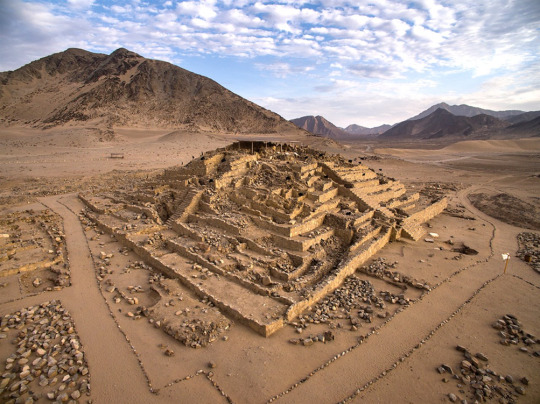



#Curiosities
The Sacred City of Caral-Supe, one of the most important and little-known cultures of the American continent, is located in the province of Barranca, Lima Region, Peru.
“It constitutes the oldest manifestation of civilization in Peru and on the American continent due to its 5,000 years of age. It is made up of 32 monumental buildings, included in a complex system of settlements that show a strong religious ideology, among which are distinguished ceremonial buildings, residential sectors for people of different social rank, a set of minor temples and production workshops. Caral led a settlement system that brought together 17 similar, although smaller, sites located in the Supe Valley.
“It expresses the complexity and development of an early socio-political and economic organization model during the Late Archaic Period (5000-3800 BP) originated independently by the Andean societies that inhabited this small fertile valley on the central Peruvian coast.”
Information:
World Heritage Sites of Peru. Culture Ministry.
372 notes
·
View notes
Text
archaic games on neopets with rewards that were designed when there were like 20 items on the site, and are almost literally pointless to play in its terrible economy, feel like when an elderly person, completely unaware of inflation, kindly slides someone an amount of money that hasn't covered any fee in the past 20 years. "CONGRATULATIONS!!!!! you win 400 neopoints!!!!" I can't even buy a half-eaten apple with that
187 notes
·
View notes
Text

Blue Perennem
Common names: taintflower, gooch poppy, grundlebundle, taint-patiens, pussy willow, butt-ercup, nether-lily, panty-petunia, chrysanthebum, down-low daisy (1)
Appearance: Leaves and stems are greyish or black, and similar in shape to those of a rose bush. Flowers are a vivid blue, each with six petals, and each petal bearing distinct variegation that resembles a screaming face.
Etymology: Most scholars agree Blue Perennem takes its name from Archaic Common word perennis, meaning "everlasting", possibly in reference to its survival in harsh environments or its use in healing medicines. However, folklore points to its origin in the Modern Common word perineum, which informs many all of its common names. The association of perineum with the flower itself is unclear. It may be that in some phenotypes, the center of the flower markedly resembles an anus, and thus the petals would be analogous to the aforementioned perineum.
Distribution: Blue Perennem is an uncommon flower native to the Grey Valley, a region of the Cliffkeep Mountains north of the Umbra Hills in Tal'Dorei. It can be found growing in areas rich with demonic energy, cursed magic, death, loss, or other sites where significant conflict has occurred.
Uses and cultivation: Blue Perennem is used in powerful restorative medicines, in particular those reversing damage caused by poisons. Cultivation is largely unsuccessful. Despite Blue Perennem's hardiness against the hazards of its native environment, it poorly tolerates transplanting. Advocates of the perineum-origin etymology point to this as an example countering the flower's association with "everlasting".
(1) the author received many unsolicited contributions for this entry from amateur arcano-botanists, especially for common names of the Blue Perennem. Most have been reluctantly included for the fulfillment of linguistic descriptivism, though this author doubts the validity of several of them, especially those from parties who made many submissions and were giggling as they handed over their papers.
#please note this is a comedy post and not a Lore post#though I have used some Lore of course#yes I spent about two hours doing this#it was well spent#please stay tuned for regularly scheduled liveblog activity#cr spoilers#ariadne draws CR#(what at thing to put in that tag)#c3e67#c3#critical role#op#fanart
462 notes
·
View notes
Text
How to choose a first name
do not repost
First names often stick with someone for their whole life, even though it's becoming more popular to change their first name to reflect their own personality. A name chosen before someone can even develop a personality/is born can lead to names that don't fit a person that well. In fiction, you already know a character's whole personality and can name them accordingly.
First names can be more experimental, since they are freely chosen by the name givers, not like the last names.
Origin
A first name can indicate where a character or more importantly their parents come from. Every country (and each region inside a country) has often used names and therefore names that people would associate with that country and wouldn't think twice if someone from there was named like that.
This does not mean that the name has to be originally from that country. Depending on the country and their population there will be influences from other languages over the years that make names completely normal in a country whose language does not fit that name. It may just be pronounced a bit different.
(Ex. Jacqueline was a very popular name in the 90s in Germany, despite it being hard to spell for German kids, and sounding nothing like German, while at the same time it's pronounced very different from the French or English version to still fit somewhat into the German language)
How to find good names for a specific cultural background
I do not recommend generators. They are fun, but most that I tried for German names gave reasonable last names, but very archaic first names or names that kind of looked German, but did not actually exist. Same with baby name sites. Some of these names don't make any kind of sense.
Better solution: find the Top 100 baby name lists for that specific country, it's more accurate of what is a common name there (but find the ones from the years around where your character is born. Not the most recent ones!)
Living with their first name
Decide if your character is happy with their first name and how they use it. Do they think it fits them? Do they get bullied or do they get put into a box because of it? Do they want to change it or do they only go by their nickname? Does it fit their last name? Who calls them by their first name?
An unfitting name
Here are some examples for why a name might not fit a character that well or why it could be surprising to be named how they are. This can be fun to explore in a story and give some insight into their parents' thought process and motives.
Parents that want their child to assimiliate easier to a new country by giving that child a normal name for that country, but that doesn't fit with their own cutural origin
Parents that want their child to succeed in life by giving them a name that they think is a royal or upper-class name, or a name fit for a celebrity, therefore choosing names that are not common in their own surroundings
The parents subscribe to a lifestyle that fits the name (a very old-fashioned one, or one that seems more free-spirited), even though the nameholder may not fit into that lifestyle
More: How to use nicknames | List of Names
Coming soon: a guide on how to name your characters in general and how to choose a last name specifically
If you like my blog and want to support me, you can buy me a coffee! And check out my Instagram! 🥰
#writing advice#how to write#how to name your characters#how to choose a first name#names#creativepromptsforwriting#writing ideas#writing prompts#writing inspiration#creative writing#writing prompt#writeblr
473 notes
·
View notes
Text


2,500-Year-Old Greek-Illyrian Helmet Discovered in Croatia
Archaeologists discovered a Greek-Illyrian helmet dating 2,500 years in very good condition on Croatia’s Pelješac peninsula.
The same team that found the Greek-Ilyrian helmet in 2020, in the same place, has found the next helmet, which according to the first analysis is older than the one found earlier.
The previous example most likely belonged to a member of the warrior elite who was interred there because it was discovered in a grave with pieces of iron weapons.
Archaeologists think the recently discovered helmet may have been a votive deposit because it was discovered in a dry stone-walled addition to a grave.
Greco-Illyrian type helmets originated in Peloponnese, Ancient Greece, where it likely evolved from the Kegelhelm (or Kegel type) of the Archaic Period.
The Greek-Illyrian helmet is extremely rare
Both of the helmets found are of different types and dates: The helmet discovered in 2020 was of a type commonly used in Greece and Illyria in the 4th century BC. It was an open-faced helmet with a rectangular cross-section for the face and decorative edges.
The newly found helmet is thought to date from the 6th century BC and is extremely rare. Finding two different Greek-Illyrian helmets at one site is unprecedented.
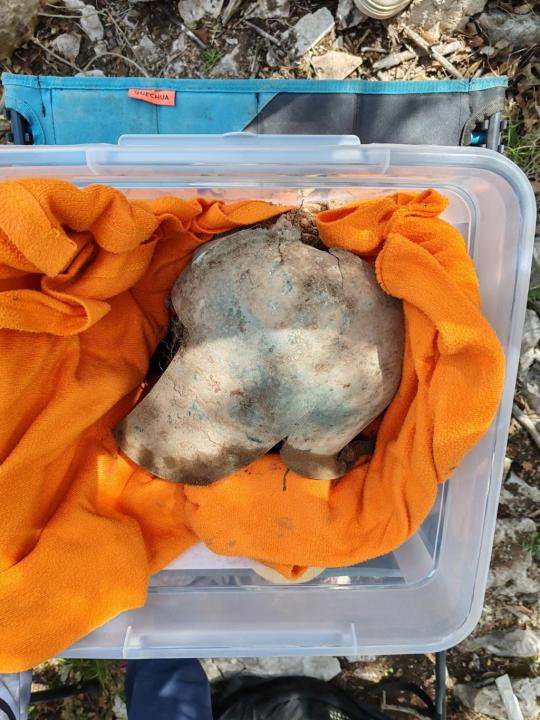
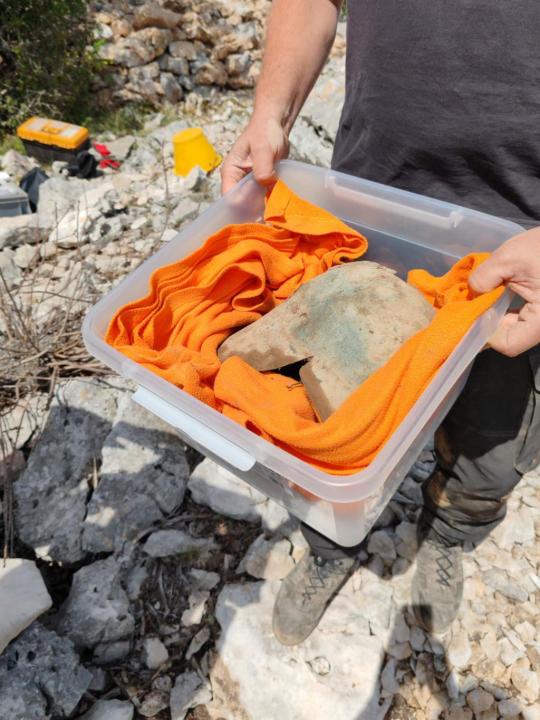
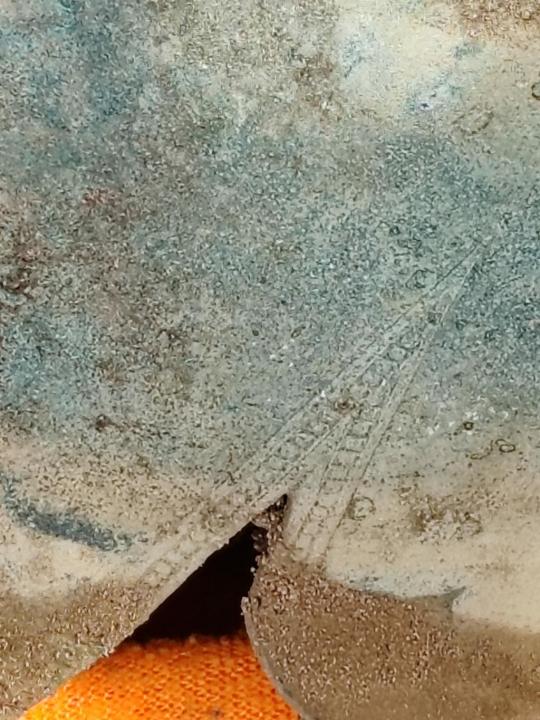
This find, along with a wealth of clothing, jewelry, and burial artifacts unearthed since the excavations began, greatly expands our knowledge of the funeral practices of Illyrian communities in the latter half of the first millennium BC.
The Illyrians were a group of Indo-European-speaking people who inhabited the western Balkan Peninsula in ancient times. They constituted one of the three main Paleo-Balkan populations, along with the Thracians and Greeks.
“What is very interesting is that two different types appear here in the same place, which speaks of a continuity of power of the respective community. These helmets have always been a symbol of some kind of status and power,” said Professor Hrvoje Potrebica, from the Department of Archeology of the Faculty of Philosophy in Zagreb.
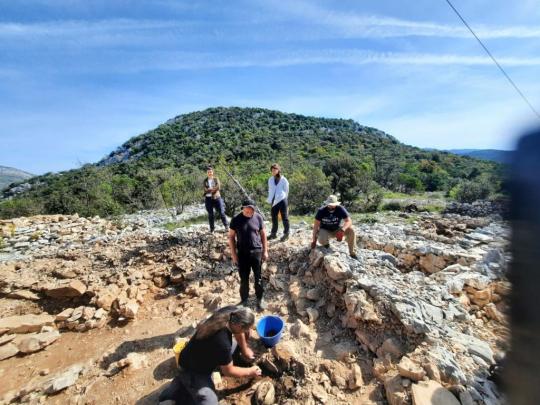
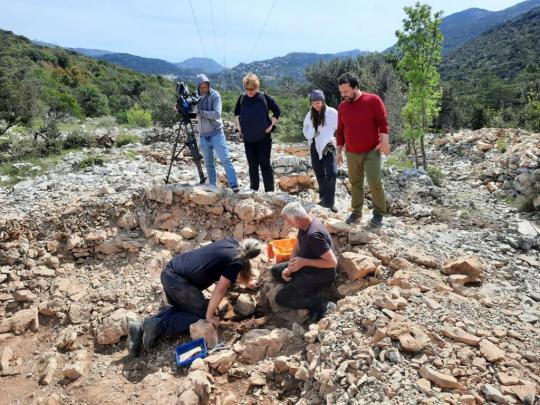
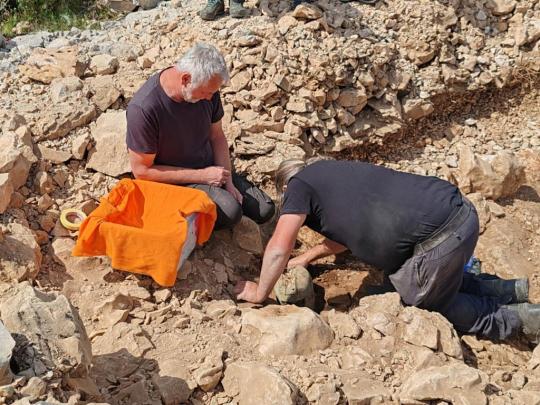
Speaking on the discovery, a representative from the Dubrovnik Museum said: “Along with numerous finds of jewelry, costumes and grave goods, this find of a helmet contributes in many ways to the knowledge of funeral rituals of Illyrian communities in the second half of the last millennium BC, and it ranks the area of Pelješac as one of the most important archaeological zones of the eastern Adriatic coast.”
Recently, archaeologists in Southern Italy have unearthed several significant artifacts, including two helmets, fragments of weapons and armor, and pottery shards, at an archaeological site in the ancient Greek city of Velia.
By Tasos Kokkinidis.
#2500-Year-Old Greek-Illyrian Helmet Discovered in Croatia#ancient Greek city of Velia#ancient artifacts#archeology#archeolgst#history#history news#ancient history#ancient culture#ancient civilizations#greek history#greek art
123 notes
·
View notes
Text
YOOOOOOOOO FRANCE IS BANNING PORN SITES FROM BEING ACCESSIBLE TO MINORS!!!
men are crying about it of course.
also, france is moving to add abortion rights to the constitution, so that it'll always be legal on SOME level, though there is much to be desired from their 14 weeks without restriction law (some people mistake this as meaning you cannot get an abortion after 14 weeks, but it means that you need a doctor to sign off because it then becomes a medical procedure, and virtually all do. the law is still archaic because every other medical procedure is just covered under general medical laws, but i guess you NEED to have abortion specifically in law to reverse the harm done by it being explicitly illegal previously).
good on france this week.
939 notes
·
View notes
Note
have you any adaptations of norse myth as complete as the eddas but in a more accessible format? or a modernized english translation? ive tried reading the eddas a few times but struggle with the archaic language so i prefer other texts, including those on your site, but they all focus (understandably) on the more well-known stories while only briefly mentioning others. they solve the antiquity of the eddas but in the process omit lots of gems! am i chasing unicorns here?
It's out-of-print, but I generally recommend d'Aulaires' Book of Norse Myths for a first-time read.
It's a children's book, so the authors gloss over a few of the cruder things (such as Loki tying his balls to the beard of a goat to make Skadi laugh), but the way they've chosen to adapt these oral stories into a linear book-format is nothing short of brilliant. They've woven a shocking amount of extant and historically-attested tales within the book, and being that it's a children's book, everything is very easy to read and understand.
They objectively did a spectacular job with how they organized everything. I think it helped that Ingri d'Aulaire was Norwegian and grew up with the oral tradition. It's clear to me that she didn't need to rely on how these tales are formatted in the old Icelandic sagas; she knew how to restructure them while still conveying the same information.
One thing to note about this book, though, is that it's not designed to give you the same experience you'd have with the oral tradition, nor is it intended to fulfill the same anthropological function. Its purpose is just to share the cultural stories. But the fact it's extraordinarily successful at fulfilling this purpose is why it's my go-to recommended retelling at this point in time.
98 notes
·
View notes
Photo
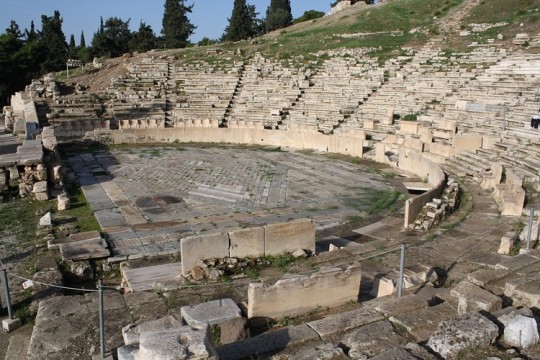
Theatre of Dionysos Eleuthereus
The theatre of Dionysos Eleuthereus on the south slope of the acropolis of Athens was first built in the 6th century BCE. Modified and expanded over the centuries, it is the oldest Greek theatre and is the site where some of the most famous Greek plays from antiquity were first performed.
Early Form
The theatre was part of a wider sanctuary dedicated to Dionysos Eleuthereus from the Archaic period. The cult to the Greek god of wine, merriment, and theatre was brought to Athens via the nearby deme of Eleutherai, although it can be traced back to Mycenaean times. A temple to Dionysos was first constructed by Peisistratos in the 6th century CE, and a circular area of tramped earth nearby was reserved for religious ceremonies where spectators took their seats on the hillside. Eventually this space evolved into a purpose-built theatre where Greek comedies and tragedies were performed, themselves evolved from earlier religious practices which included singing, wine drinking, animal sacrifices, and the wearing of masks. The climax of the celebrations was the Great Dionysia held each year in March/April, during the month of Elaphebolion, where the most famous playwrights such as Euripides, Sophocles, and Aristophanes presented their plays in competition.
Continue reading...
115 notes
·
View notes